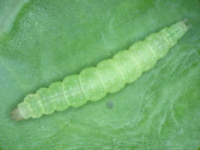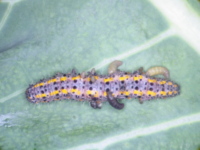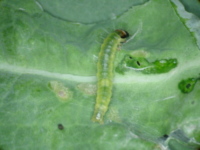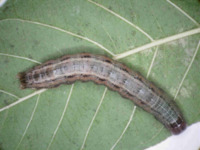For the southern armyworm, the hotter the better?
 This was the question we asked in the title of the new paper published by NEMI. The questioning refers to the southern armyworm (Spodoptera eridania), an agricultural pest that has been causing significant damage to soybean and other economically important crops. Because insects do not regulate their body temperature, variations in air temperature drastically affect their development and survival. In general, the higher the temperature, the faster the development and population growth of insects. However, one can question whether the predicted increase in temperature due to climate change will exceed the upper threshold tolerated by the southern armyworm. To answer this question we used information on the southern armyworm biology obtained under laboratory conditions at UFSC campus of Curitibanos, mathematical models, and daily temperature data for southern Brazil.
This was the question we asked in the title of the new paper published by NEMI. The questioning refers to the southern armyworm (Spodoptera eridania), an agricultural pest that has been causing significant damage to soybean and other economically important crops. Because insects do not regulate their body temperature, variations in air temperature drastically affect their development and survival. In general, the higher the temperature, the faster the development and population growth of insects. However, one can question whether the predicted increase in temperature due to climate change will exceed the upper threshold tolerated by the southern armyworm. To answer this question we used information on the southern armyworm biology obtained under laboratory conditions at UFSC campus of Curitibanos, mathematical models, and daily temperature data for southern Brazil.
Our results showed that the increase in temperature predicted by different climate change scenarios will favor the population growth of the southern armyworm in most of southern Brazil, especially in northern Rio Grande do Sul and in the mountainous regions of Santa Catarina. On the other hand, the higher temperatures predicted for northwestern Paraná will negatively affect this species. These results have implications for the management of the southern armyworm, whose recent outbreaks in Bt soybean crops have worried farmers.
Our paper entitled “The hotter the better? Climate change and voltinism of Spodoptera eridania estimated with different methods” was published in the Journal of Thermal Biology, and can be obtained here.
Soon we will bring news about other publications of NEMI!











Comments